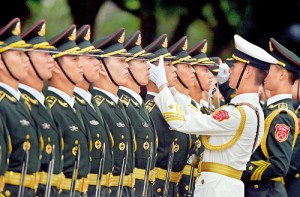Sunday Times 2
Channelling China’s aspirations
CAMBRIDGE – China has begun to stretch its economic and military muscles in recent years. In the South China Sea, it has built a series of quasi-military bases on the tiny Spratly Islands and deployed warships to defend them. Meanwhile, it is sponsoring the new Asian Infrastructure Investment Bank (AIIB) – an international institution that threatens to rival the World Bank in Asia – and has persuaded countries like the United Kingdom, Germany, and France to join, over the vocal objections of the United States.

Chinese soldiers adjust their positioning before performing in an honour guard for India's Prime Minister Narendra Modi outside the Great Hall of the People in Beijing on Friday. AFP
It is easy to conflate China’s saber-rattling with its economic and diplomatic initiatives such as the AIIB, as some US officials seem to have done. But, while China’s rise does merit some caution, it does not make sense to resist the country at every turn; sometimes, it is wiser to leave well enough alone.
While China’s military and economic actions are interlinked, those links provide an opening for the latter to mitigate the former. Indeed, a more supple American policy would seek to play these two aspects of Chinese policy against each other.
The US, however, has attempted to hamper China’s economic and diplomatic rise. In 2010, long before the AIIB was introduced, the International Monetary Fund agreed to give China and other rapidly growing countries more financial responsibility and a greater say over important decisions. China’s IMF “quota” – established when it was a far smaller economy – gave it only 4% of the votes and financial responsibility; but China is now four times as important for the world’s economy.
The proposed IMF reforms, intended to reflect the new weight of China and other emerging markets in the global economy, were structured in a way that would have granted China more influence, but also would have required it to contribute more money for development projects around the world. The US would have continued to hold a decisive share of the votes.
But, although the reforms were passed with overwhelming support, including from US diplomats, they remain unimplemented, because the US Congress has yet to approve them. Since then, the Chinese economy has nearly doubled in size – making the agreed reforms obsolete.
If congressional intransigence was intended to prevent China from gaining economic influence, it seems to have backfired. It was presumably in response to this impasse that China pressed ahead with establishing the AIIB.
The size of China’s economy — and its resulting diplomatic weight — is a fact that cannot be wished away. A strategy of containment worked well for America and its allies during the Cold War, but it cannot be applied today without flexibility and strategic common sense.
Critics of America’s policy point out that even if the US had thwarted the effort to establish the AIIB, China would continue to project power in Asia, and around the rest of the world, one way or another. Channeling that influence through a newly created international organisation, they argue, is more likely to temper raw power grabs. (Moreover, America’s European allies were expected to join the AIIB despite American opposition, if only to bid as insiders on contracts for the bank’s projects. A great power does not oppose its allies when they are clearly going to defy it.)
The question is thus not whether China can be kept weak and in check, but through which channels it will exercise its influence as a newly affluent country. Economic means – like the AIIB – are one possibility. But military confrontation is another. China’s leaders, from Deng Xiaoping to Hu Jintao, pursued a “peaceful rise”; the current generation of leaders, by contrast, no longer seems to see the need to remain so tranquil.
The willingness of the People’s Liberation Army to challenge other countries’ ships in the South China Sea, including a US Navy cruiser in 2013, suggests that military confrontation cannot be ruled out. Though China currently lacks the naval resources to confront the US in the Pacific, it may not lack them forever. And, in the meantime, US allies in the region lack the military means to stare down the Chinese military without American assistance.
To be sure, the creation of the AIIB and the sponsorship of development projects across the region will enhance China’s economic and political clout, which in turn could extend its military influence. Money still buys power, and new infrastructure projects are likely to come with strings attached. But America’s energy and resources would be far better spent containing China’s military aspirations than trying to prevent it from further engaging with the world in the economic sphere.
Of course, economic engagement provides no guarantee of peaceful relations. If trade and financial ties always prevented war, the twentieth century would have been far less bloody, and Russia would be far better behaved today. But they do improve the chances of peace. And, as long as China is channeling its power into infrastructure-oriented economic development, opposing it would be foolish.
The closer China’s economic ties with the rest of the world become, the more it will have to lose from a breakdown in international relations. It is better that China’s leadership be convinced that economic engagement is the optimal way to project power abroad, while improving living standards at home, than for its leaders to conclude – as Russia’s seem to have done – that military confrontation is the best path to international respect.
(Mark Roe is a professor at Harvard Law School.)
Copyright: Project Syndicate, 2015. Exclusive to the Sunday Times
www.project-syndicate.org

